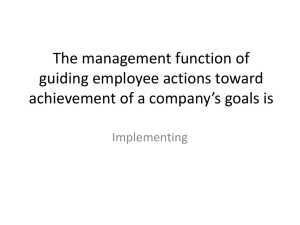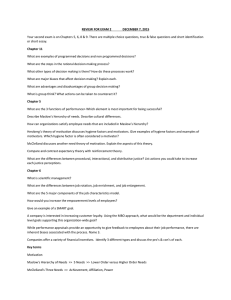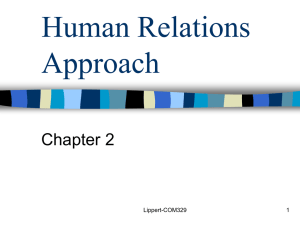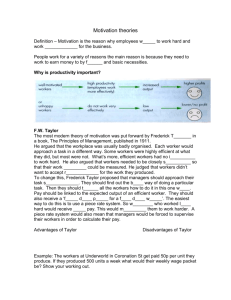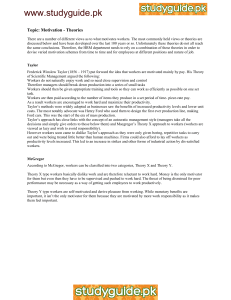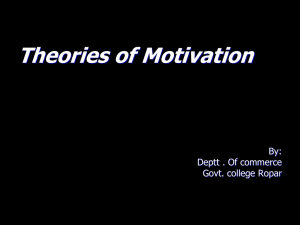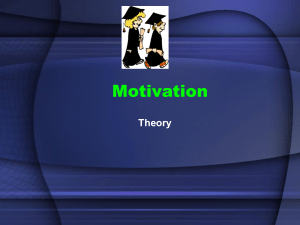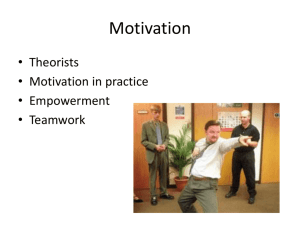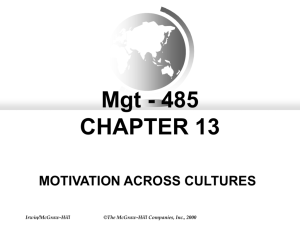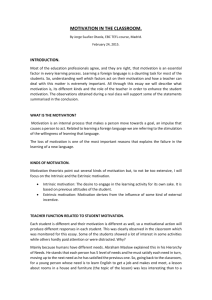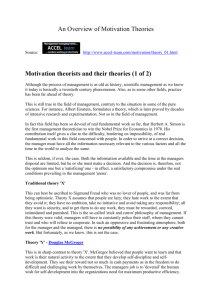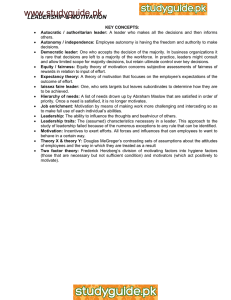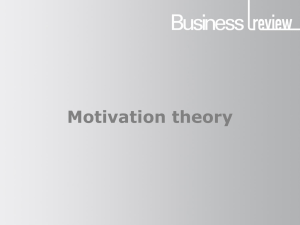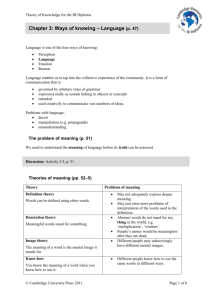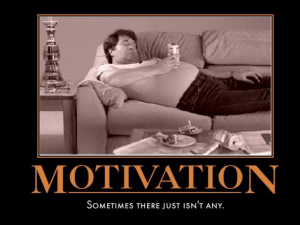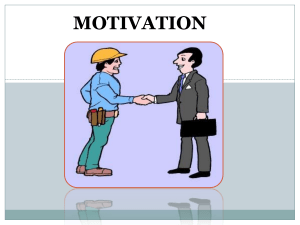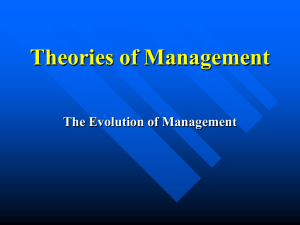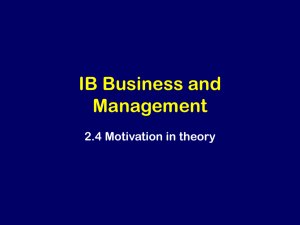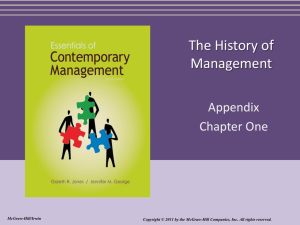Extension worksheet – Topic 6 - Cambridge Resources for the IB
advertisement
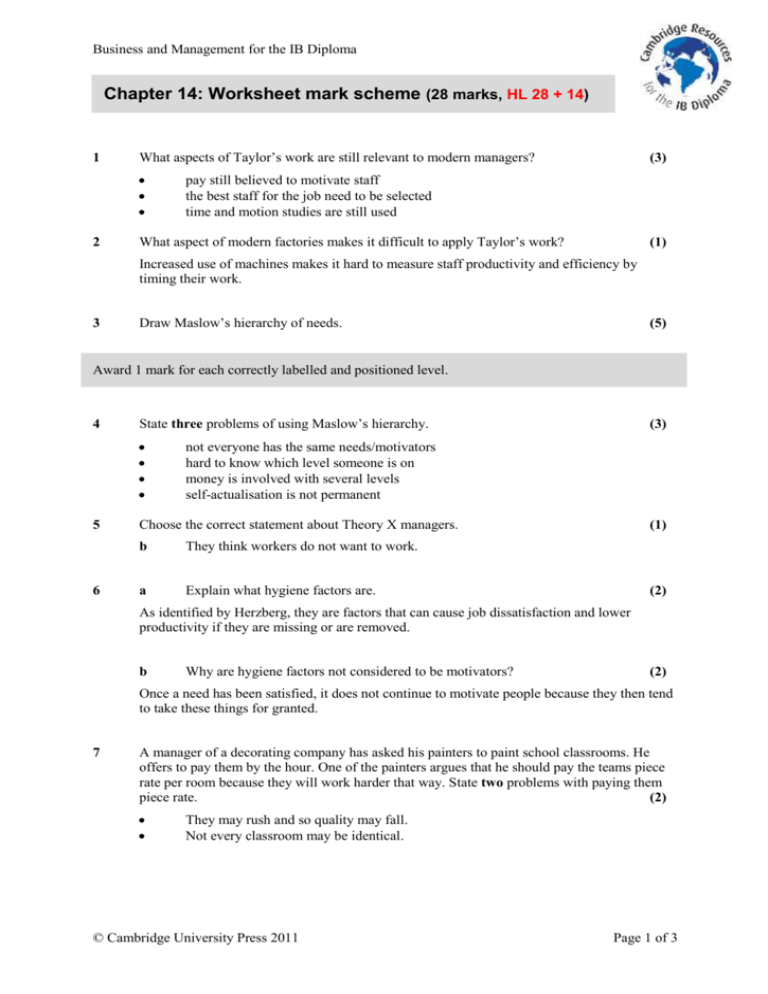
Business and Management for the IB Diploma Chapter 14: Worksheet mark scheme (28 marks, HL 28 + 14) 1 What aspects of Taylor’s work are still relevant to modern managers? 2 (3) pay still believed to motivate staff the best staff for the job need to be selected time and motion studies are still used What aspect of modern factories makes it difficult to apply Taylor’s work? (1) Increased use of machines makes it hard to measure staff productivity and efficiency by timing their work. 3 Draw Maslow’s hierarchy of needs. (5) Award 1 mark for each correctly labelled and positioned level. 4 State three problems of using Maslow’s hierarchy. 5 6 (3) not everyone has the same needs/motivators hard to know which level someone is on money is involved with several levels self-actualisation is not permanent Choose the correct statement about Theory X managers. b They think workers do not want to work. a Explain what hygiene factors are. (1) (2) As identified by Herzberg, they are factors that can cause job dissatisfaction and lower productivity if they are missing or are removed. b Why are hygiene factors not considered to be motivators? (2) Once a need has been satisfied, it does not continue to motivate people because they then tend to take these things for granted. 7 A manager of a decorating company has asked his painters to paint school classrooms. He offers to pay them by the hour. One of the painters argues that he should pay the teams piece rate per room because they will work harder that way. State two problems with paying them piece rate. (2) They may rush and so quality may fall. Not every classroom may be identical. © Cambridge University Press 2011 Page 1 of 3 Business and Management for the IB Diploma 8 List five methods of financial motivation. 9 10 performance-related pay profit-related pay commission pay rises bonuses giving shares in company (earn dividends/can be sold) valuable fringe benefits Give a short explanation of the forms of non-financial motivation listed below. (5) (4) job enlargement: give staff more to do job enrichment: give more interesting/challenging things to do team working: gives variety, social contact and raises team spirit (also known as cell production/ job rotation) empowerment: delegate authority and responsibility, which demonstrates confidence in the worker (HL) What is the ‘Hawthorne effect’? (3) This is the effect noted when working conditions were changed by Mayo at the Hawthorne electricity plant in the USA. Both positive and negative changes in working conditions improved productivity for a limited period. Longer-lasting changes were achieved by developing the ‘people’ side of business: taking an interest in workers, working in teams, and passing some degree of control/decision-making to workers. 11 (HL) What are the three types of motivational need identified by McClelland? 12 (3) achievement power (authority) affiliation (social relationships) (HL) Why is Vroom’s theory called an expectancy theory? (2) People are motivated if they think their effort will be rewarded with a reward they want. They then expect that if they perform, they will get the reward. 13 (HL) According to Adams’s equity theory, what would demotivate employees? (2) Workers will be demotivated if they feel that the effort, dedication and expertise (inputs) they put into a job are greater than the rewards (outputs). 14 (HL) List the authors of two process theories of motivation and two content theories of motivation. (4) Process: Vroom Adams © Cambridge University Press 2011 Page 2 of 3 Business and Management for the IB Diploma Content: Taylor Maslow Herzberg McGregor Mayo McClelland © Cambridge University Press 2011 Page 3 of 3

